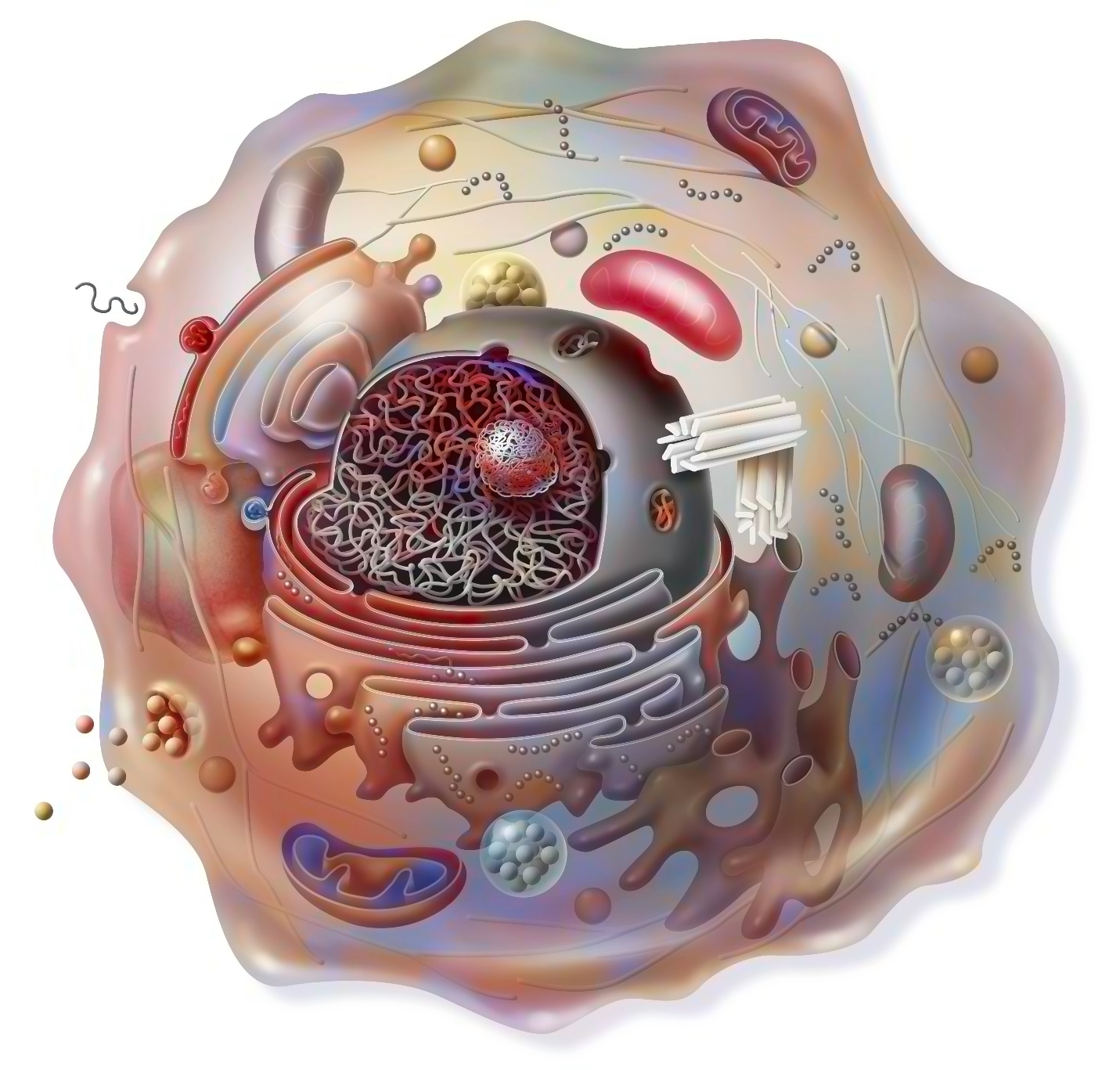BP 184
Why do humans possess the ability to remember? I’m sure evolutionists would proffer some answer related to the survival of the fittest, namely, how blind, random, mindless mutations over millions of years “developed” a part of the animal brain that had the ability to remember, and that this ability helped them to outlive their peers who did not develop memory.

But we must be careful with our language here. We must not use words like “developed.” As was just mentioned, in evolution there is no mind at work, only accidental selections that persist because they help the organism survive, so there is no such thing as “development” since the act of developing signifies intelligence and there is no intelligence at work in mindless, godless, evolution. Witness (pictured above) the complexity within one cell in the body. We now know that every cell in the human body contains information, and information comes from intelligence.
Evolution would say that the accidental “development” of eyesight and hearing persisted because these evolved senses helped the human see and hear danger and so avoid it and live longer. In the same way, the natural selection of memory persisted because it was a random and accidental “acquisition” that assisted those organisms to survive. Those organisms that did not acquire memory were less likely to survive so they died off while those with the mutation-formed ability to remember things lived on because they remembered not to walk on thin ice or step on a stone fish or pet a saber-toothed tiger.
As a brief aside, I believe that the book of Proverbs is the godly version of evolution’s survival of the fittest. Proverbs teaches us that survival is not about natural selection through random biological mutations but all about being the wise person who hears and obeys God instead of the foolish person who rebels and pursues his or her own path in life. For example, Proverbs 27:12 says, “The prudent sees danger and hides himself, but the simple go on and suffer for it.”
Those who are wise and listen to God will survive. Those who are foolish will fall into the very pit that they dug.
Truth be told, I have no time for evolution, especially at the macro level. I know that some people who believe in God assert that He could have created the world through evolution. But how can you in the same breath say that the God who designed the human being “fearfully and wonderfully” (see Psalm 139) embrace a theory that claims that everything that exists in the world is here by random accident? I find it an oxymoron of the highest degree.
But I am not here today to address evolution. No, I am here to briefly consider the role of memory in the mind and heart and soul of the human being made in God’s image.
To begin, then, if we do believe that men and women have been created in God’s image, human emotions (even anger), along with strong desire, a thirst for adventure, a drive to paint, write, sculpt, sing, play musical instruments, as well as a hunger to be in relationship with others, and even the ability to remember—these all come from God’s character. Humans possess these good attributes because we carry within us the imago Dei.

Why is memory something humans share with God? Why has it been created within us (along with other attributes like a deep desire for relationship)?
As we have discussed at DTFL in the past, the Triune God has existed forever. The three persons of the Holy Trinity consisting of the Father, the Son, and the Holy Spirit have many attributes. These attributes so often seem to be relational in nature. Said another way, the attributes of the Triune God promote relationship and are all about being with others instead of being separate and alone, moving toward others, instead of away from them, loving them and preserving their lives instead of hating them and desiring their demise and destruction.
Just consider these actions that describe God’s character: reconciling, redeeming, forgiving, restoring, sacrificing, dying in our place so that we might approach the Father, making peace between us and God. All these actions/attributes are relationship driven.
In a similar way, memory or the act of remembering is a relational attribute as well—or at least it can be if our remembering is accompanied by the attributes mentioned above. Psychologically speaking, being remembered by others is not a luxury but a bedrock need that humans must experience. One might claim that being remembered by others is a necessity to thrive just as much as human touch is a necessity for babies to thrive instead of failing to thrive.
So, if evolution is what you embrace in this world, then you are in trouble. If the basic need to be remembered (seen, loved, known) is essential for human thriving, then a godless evolution-based explanatory theory will leave you alone in the universe and you will not experience the survival of the fittest. Those who will survive and also go on to thrive are those who live in a universe where they experience not only the love of other humans around them but also the unconditional love of the One who designed and created them on purpose for a purpose.

The Bible is full of references about God remembering His people and the promises He made to His people. Memory is at the core of God’s love for humanity. Consider Exodus 2:23ff: “During those many days the king of Egypt died, and the people of Israel groaned because of their slavery and cried out for help. Their cry for rescue from slavery came up to God. And God heard their groaning, and God remembered his covenant with Abraham, with Isaac, and with Jacob. God saw the people of Israel—and God knew.”
God’s remembering of His people and His promise are what led to the amazing Exodus from the land of slavery.
In addition to God remembering us, humans are commanded time and time again in scripture to remember God and His faithfulness and to rehearse His past goodness and acts of kindness so that they will experience Him as a good and remembering God they desire to approach instead of run from.
If you take one thing away from this post, remember this: remembering God’s faithfulness and goodness to you in the past is the key ingredient to future trust in God. There would be no trust if there was no ability to remember His kindnesses toward you in the past. So, thank God for memories. Yes, in this fallen world, so many memories can be so painful that they take your breath away. But as you seek and remember God’s repeated Presence in your life–even in or especially in the valley of the shadow of death–you will grow to trust Him day by day and year by year.
So, remember to thrive, not simply survive. Remember to seek Him who remembers His promises to you. Remember to look at His face instead of at the wind and the waves of this world. Rehearse memories of His faithfulness in the past. For He has said, Is Ephraim my dear son? Is he my darling child? For as often as I speak against him, I do remember him still. Therefore my heart yearns for him; I will surely have mercy on him, declares the LORD” ~ Jeremiah 31:20
God remembers you! So sons and daughters of the King, remember Him!

“For you formed my inward parts;
you knitted me together in my mother’s womb.
I praise you, for I am fearfully and wonderfully made.
Wonderful are your works;
my soul knows it very well.
My frame was not hidden from you,
when I was being made in secret,
intricately woven in the depths of the earth” ~ Psalm 139:13ff
